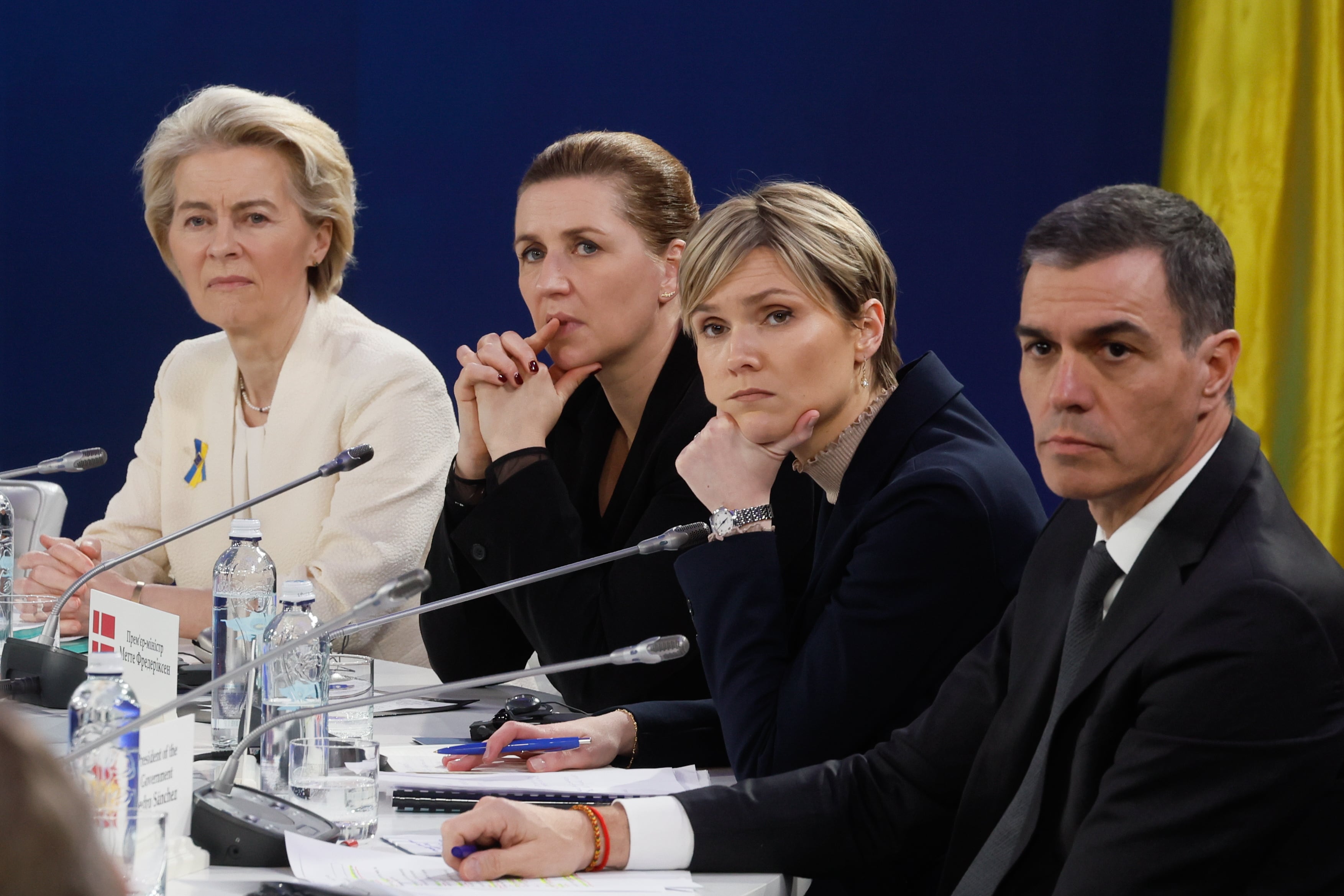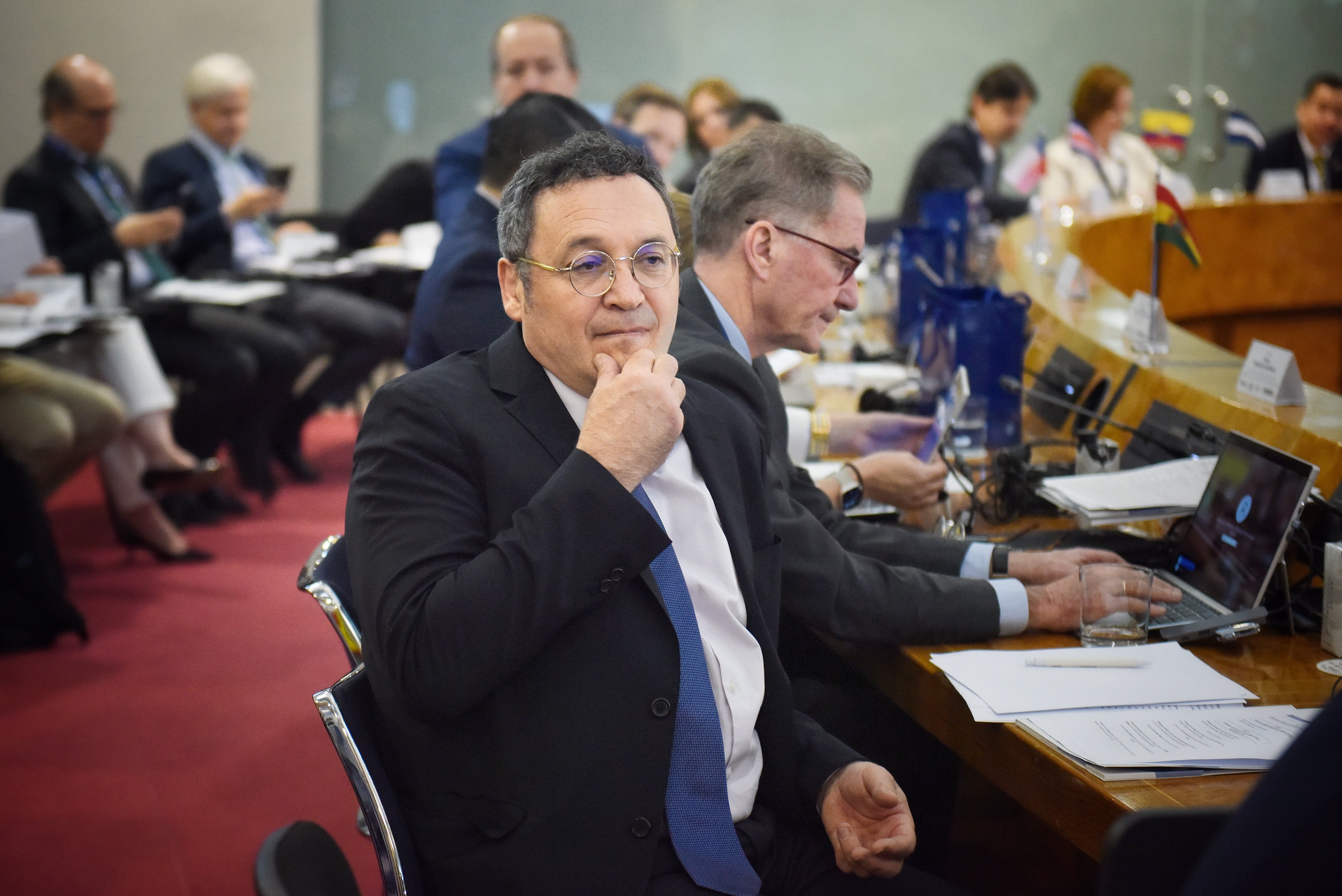Spain advocates strengthening the EU economic « defense and deterrence » shield before the commercial war | Spain

« In 2025, » says the government’s external action strategy until 2028, « our societies attend the erosion of the order built after World War II, with a question of the rules and principles that for several decades have provided a reasonable degree of order and predictability to international relations. » The document, approved last Tuesday in the Council of Ministers, and to which the country has had access to three. reinforce European autonomy, both economic and defense;
Faced with the threat of USA, « More Europe »
Spain advocates a « structural transformation » of the institutions and policies of the European Union that includes an increase in its « deterrence and defense capacities » in the face of « the degradation of security in Europe and in its strategic environment », which joins « to change of US priorities. » According to the document, the country is positioned against the « commercial replacement » confirmed that it is becoming a « worldwide trend » with the diversification of supply chains, the deepening of current alliances and creating new « trust relationships. » In the week in which the US president, Donald Trump, has ended up launching a tariff tariffs, Spain asks the EU to reinforce its « mechanisms for defense and economic deterrence » against « coercive tactics » of third parties through the reinforcement of « its commercial defense instruments. » And for this, he believes that the EU must « endow more technical capacity in sanctions » and « export control », as well as a more coordinated and structured framework between member states in investment control.
The text that sets the position for Spanish external action also exposes a deep transformation of the EU in several directions. One of them goes through the elevar the bar in the field of defense, passing « progressively » from the current common security and defense policy to « a true common defense » in a very broad sense, which goes from « the domains of traditional defense » to others such as hybrid threats or terrorist threats, in line with what Backed by the President of the Government, Pedro Sánchez, in Brussels. This reinforcement, the document continues, should also be reflected in the planning and development « of » command and control « capacities, for example, to » reinforce the rapid deployment capacity of the EU « , as well as in the development of a » technological and industrial base « of that sector.
Given the challenges it faces, Spain considers that the EU must also make a leap in the size of its budgets, which have traditionally been an amount equivalent to 1% of the European Bruta Income (RNB) and that in each negotiation the northern countries struggle to reduce. Sánchez’s government ambitions the opposite: « Spain defends to begin by folding European resources in the next multiannual financial framework, » he argues, through new resources and the issuance of joint debt, which has already recently rehearsed, for example, with the Next Generation EU funds (750,000 million) or with the system to finance employment protection systems such as ERTE (100,000 million). « Only with budget ambition it will be possible to face the new strategic challenges, especially in terms of competitiveness, including the triple green, digital and social transition and security and defense, without sacrificing the policies that have made sense to the union, such as agricultural and fishing or cohesion, » says the text.
Spain, which is committed to leaving behind the need to adopt decisions in the EU due to « unanimity », see key to increase the economic competitiveness of the block, in line with the conclusions of the Draghi report, and deepen the single market without giving up the « regulatory certainty » offered by Brussels. The document also advocates leading the « decarbonization » of the economy and claims the « digital sovereignty » of the twenty -seven, in which until now it has been lagging behind, especially with respect to the United States.
Multilateralism: Limit the use of veto
The Government undertakes to « maintain comprehensive support to Ukraine in the defense of its sovereignty », as well as « accompanying the adhesion processes of Western Balkans and other candidate countries » to enter the EU. With Russian invasion, The Executive considers that « the weaknesses of multilateralism » and the « United Nations Security Council paralysis » have been verified. « Given the inaction, » adds the document, Spain proposes to strengthen what works and reform what is not. Thus, it raises the need to reform the United Nations Security Council to be « more effective, transparent and representative » expanding the number of non -permanent members and limiting the use of veto.
For Spain it is also essential to « ensure the centrality of the World Health Organization », weakened after the Trump’s decision to leave the agency, of which the US was the first taxpayer. « We will continue to promote their work after our incorporation into its Executive Committee and, in particular, the negotiations of an international treaty on pandemics. We will also work to move towards universal health coverage from the experience of our national health system and a global health strategy will be adopted, aimed at strengthening the role of Spain and our cooperation in this area, » says the strategic document.
The text also ratifies Spain’s commitment to international justice and specifically, with the International Criminal Court, after Hungary announced this week His departure from the agency to receive the prime minister of Israel, Benjamin Netanyahuon which an arrest warrant for war crimes and against humanity in Gaza weighs.
Development cooperation
Faced with the war declared by Trump from the US Against Aid and Development Cooperation EntitiesSpain also bets as « State Policy » for development cooperation as a tool for peace and security. But the document raises the need to promote « a new narrative » on the subject, which transits « of the logic of the aid to the alliance », objective of the fourth conference for the financing of development that will take place in Seville this summer. In addition to « reinforcing budgetary commitments » (to reach 0.7% of the RNB in 2030), the government wants to reform the cooperation system so that it is decentralized (including autonomous communities and municipalities, universities, NGOs and the private sector), and that the new regulation of subsidies serves to speed up the processes.
« Democratic resilience »
The document exposes as a risk to coexistence and democratic processes itself, « algorithmic biases, privacy erosion and increased hybrid strategies for misinformation, manipulation and interference of foreign information (FIMI) or cyber attacks », together with the threat of artificial intelligence, which in the wrong hands can contribute to “distorting“ distort polarization by creating false content » Through hybrid strategies that include media manipulation, the promotion of European decline narratives, climatic or migratory misinformation, they seek to erode citizen confidence in institutions and feed the extremism to legitimize their authoritarian models and reconfigure international order in their benefit. « To combat this, Spain bets on » greater transparency, neutrality and accountability Technological. « » Anonymity cannot be synonym for impunity for the commission of crimes, nor serve as a tool for the impersonation of identity and illicit and fraudulent practices. It is also necessary to deepen algorithmic transparency. Platforms and their managers must take responsibility for the negative impact of their services and behaviors. Together with public actors, digital platforms must collaborate to stop foreign influence operations and misinformation, prioritizing the protection of vulnerable groups against hate speeches, ”adds the document.
The relationship with Morocco
Despite the Government’s position change regarding the Saharathe only reference on the matter in the strategic document of external action states that Spain ”will continue to support the irreplaceable work of the United Nations in the promotion of international peace and security through its institutional architecture but also through the political work of the special envoys, such as those of Syria, Yemen or the Western Sahara”. In June 2022, the President of the Government He ratified the turn that involved Spain openly took part for Rabat when considering your proposal of autonomy as « the most serious, realistic and credible base for the resolution of the contentious » in the Spanish ex -olia. The road map in foreign policy from here to 2028 states that « bilateral relations with Morocco are at their best. » Last February, the PSOE was The only game that voted against of the taking into consideration of a proposition of the law of adding, partner in the coalition government, to facilitate granting Nationality to those born during the Spanish administration period of Western Sahara.







